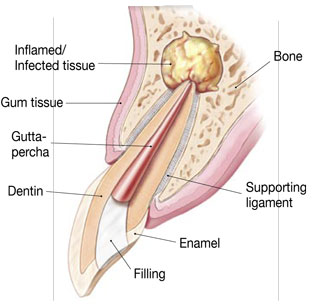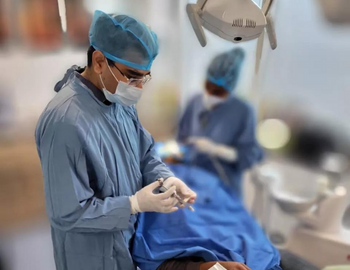TMJ Disorders and Treatment in Gurgaon
Apicoectomy & Root Canal Treatment: The Best Care for Your Teeth
If you’re suffering from tooth pain, swelling, or discomfort, you might be wondering how to solve the problem and get back to enjoying your life. Dental issues, especially when they involve the pulp or root of your tooth, can be serious and often cause significant disruption to your daily activities. At the Oral Surgery and Dental Implant Center in Gurgaon, we specialize in Apicoectomy and Root Canal Treatment under the skilled leadership of Dr. Himanshu Gupta, an expert Dental Implant Surgeon and Oral & Maxillofacial Surgery specialist. With over 15 years of experience in treating complex dental conditions, Dr. Gupta offers advanced and effective treatments designed to save your teeth and restore your smile.

What is Apicoectomy & Root Canal Treatment?
Root Canal Treatment (RCT) and Apicoectomy are two essential procedures aimed at saving damaged or infected teeth. These procedures help avoid tooth extraction, preserving your natural teeth and the overall health of your mouth.
- Root Canal Treatment (RCT): When the pulp inside your tooth becomes infected or inflamed due to deep decay or trauma, Root Canal Treatment is the first step to saving the tooth. During this procedure, the infected pulp is removed, the space inside the tooth is cleaned, and the canal is sealed to prevent further infection. Root canal treatment helps eliminate pain and restores the tooth to its functional state.
- Apicoectomy (Root-End Surgery): Sometimes, a Root Canal Treatment may not fully heal, or an infection may persist in the tip of the root. In such cases, Apicoectomy, also known as root-end surgery, may be recommended. This surgical procedure involves accessing the tip of the tooth root through the gums, removing the infected tissue, and sealing the root to prevent further infection.
Both treatments are highly effective in preventing the need for tooth extraction and help keep your smile healthy and intact.
Types of Root Canal Treatments
We understand that each patient’s needs are unique. That’s why we offer various types of Root Canal Treatment based on the condition of your tooth and your specific dental needs:
Conventional Root Canal Treatment
This is the most common type of treatment and involves removing the infected pulp, cleaning the root canals, and filling them with a biocompatible material. This process is typically completed in one or two visits.
Retreatment
If a root canal has previously been performed but the infection returns, Retreatment may be necessary. This involves removing the old filling, cleaning the root canals again, and sealing the area to prevent further infection.
Apicoectomy (Root-End Surgery)
If a Root Canal Treatment doesn’t fully heal, Apicoectomy may be performed. This surgical procedure involves removing the infected tissue at the tip of the root and sealing the root end to prevent reoccurring infections.
Each treatment type is designed to address different levels of infection or damage, and Dr. Himanshu Gupta will recommend the most appropriate option based on your situation.
Why is Apicoectomy & Root Canal Treatment Important?
Infected teeth can cause significant pain, swelling, and discomfort, making everyday activities like eating and speaking difficult. If the infection is left untreated, it can spread to nearby teeth, the gums, or even the jawbone, leading to more serious complications. This can even cause tooth loss if not treated promptly. Choosing Apicoectomy and Root Canal Treatment can help you avoid tooth extraction and save your natural teeth. These procedures treat the infection at its source, restore the tooth's function, and preserve your oral health. By addressing the problem early, you can avoid painful conditions such as abscesses, gum disease, or the need for more complex procedures down the line. At the Oral Surgery and Dental Implant Center in Gurgaon, Dr. Himanshu Gupta uses state-of-the-art technology and precise techniques to ensure that your treatment is as effective and comfortable as possible.
Why Choose Dr. Himanshu Gupta for Your Root Canal Treatment & Apicoectomy?
Choosing the right dentist is crucial when it comes to your dental health. Dr. Himanshu Gupta is an expert in Oral & Maxillofacial Surgery, specializing in complex dental procedures like Root Canal Treatment and Apicoectomy. Here’s why patients trust Dr. Gupta with their oral health:
- Highly Experienced and Skilled: With over 15 years of experience, Dr. Himanshu Gupta is one of the leading Dental Implant Surgeons in Gurgaon. His expertise in treating complex dental issues has earned him a reputation for providing exceptional care.
- Comprehensive Care: Dr. Gupta takes a patient-centered approach to dental care, ensuring that you are well-informed throughout the process. He listens to your concerns, explains each step of the procedure, and provides personalized treatment plans that align with your needs.
- Cutting-Edge Technology: At our clinic, we use the latest tools and technology to perform Root Canal Treatments and Apicoectomy procedures. This ensures precision, enhances the effectiveness of the treatment, and speeds up the healing process.
- Pain-Free Procedures: Our clinic is committed to offering painless tooth extractions and dental treatments. Dr. Gupta uses advanced techniques and local anesthesia to minimize discomfort, ensuring that your procedure is as comfortable as possible.
- Post-Treatment Care: Dr. Gupta not only performs the procedures with the utmost care but also offers thorough aftercare instructions to help you recover quickly and comfortably.
If you are experiencing tooth pain, or discomfort, or need a Root Canal Treatment or Apicoectomy, don’t wait. Schedule an appointment with Dr. Himanshu Gupta today at the Oral Surgery and Dental Implant Center in Gurgaon. With his extensive expertise in Oral & Maxillofacial Surgery, you can be confident that you’re receiving the best care available. Contact us today to book your consultation and take the first step toward a pain-free, healthy smile!
Feel free to contact us today or complete our online form to book your consultation. We look forward to helping you restore your smile and dental health with the highest level of care.
How Apicoectomy & Root Canal Treatment are Performed
Root Canal Treatment Process
Consultation & Diagnosis
Your first step is a consultation with Dr. Himanshu Gupta, who will examine your tooth and likely take X-rays to understand the extent of the infection. Based on the findings, Dr. Gupta will recommend the best treatment plan.
Cleaning the Tooth
The next step involves removing the infected pulp from the tooth and cleaning the root canals. This helps eliminate the bacteria causing the infection.
Filling & Sealing the Tooth
After cleaning, the root canals are filled with a biocompatible material to prevent further infection. The tooth is then sealed, and a crown may be placed to restore the tooth's structure and function.
Restoration
In most cases, a crown is required after the root canal to protect the tooth and restore its functionality. A crown helps maintain the tooth's strength and prevents it from breaking.
Apicoectomy (Root-End Surgery) Process
Consultation & Diagnosis
Dr. Himanshu Gupta will carefully examine your tooth and determine whether Apicoectomy is necessary. If there is an infection at the root tip or if the previous root canal treatment has failed, this procedure will be recommended.
Surgical Procedure
Under local anesthesia, the gums are gently opened to access the root tip. The infected tissue is then removed, and the root end is sealed to prevent further infection. This procedure is done with precision and care to minimize discomfort.
Recovery
After the procedure, Dr. Gupta will provide specific aftercare instructions. You may experience some mild swelling or discomfort, but this usually resolves within a few days. Most patients recover quickly and return to their normal routine in no time.
Symptoms That Indicate You Need Treatment:
Persistent Pain
If you feel pain while chewing, touching the tooth, or even just when you move your mouth, it might be a sign that you need a Root Canal Treatment or Apicoectomy.
Tooth Sensitivity
If your tooth is sensitive to hot or cold and the discomfort lingers after the stimulus is removed, this could indicate a deeper infection.
Swelling & Tender Gums
Red, swollen, or tender gums near the affected tooth may be a sign of infection.
Discoloration
A tooth that becomes darker or discolored may be infected and in need of a root canal.
Abscess or Pimple
A pimple-like bump on the gums may be an abscess, which typically forms when an infection is present in the tooth.
Causes for Needing Root Canal Treatment or Apicoectomy:
Deep Decay or Cavities
When cavities go untreated for a long time, the infection can reach the tooth pulp, causing pain and discomfort.
Trauma to the Tooth
A cracked or fractured tooth due to injury can lead to an infection in the pulp, requiring a root canal or Apicoectomy.
Gum Disease
Advanced gum disease can affect the tooth root, leading to infection or damage that requires treatment.
Previous Dental Work
Sometimes, previous fillings or root canals may fail, requiring retreatment or an Apicoectomy.

Frequently Asked Questions.
If you’re experiencing persistent pain, swelling, or sensitivity in a tooth, it’s essential to schedule an appointment with Dr. Himanshu Gupta. He will conduct a thorough exam and may use an X-ray to determine the cause of the problem and whether Root Canal Treatment is necessary.
Most patients experience little to no pain during the procedure due to local anesthesia. Any post-treatment discomfort is usually minimal and can be controlled with over-the-counter pain relievers.
Recovery after Apicoectomy & Root Canal Treatment is generally quick. Swelling and discomfort typically subside within a few days, and most patients resume their daily activities in a week or less.
While these procedures are safe, risks such as infection or nerve damage can occur. However, Dr. Himanshu Gupta takes every precaution to minimize these risks and ensure the best outcome.
Yes, a crown is generally recommended after a root canal to restore the tooth’s strength and protect it from further damage.

